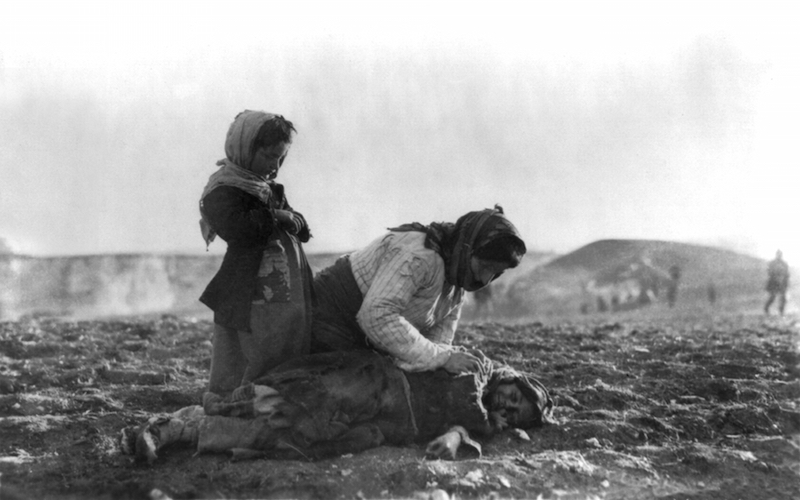
Stop “Genocidizing”
One hundred years ago the leaders of the Ottoman Empire took action against an Armenian national leadership that had sought to take advantage of the onslaught planned by the Entente powers – Britain, France, and Russia – on Ottoman land. The existential threat posed by these great powers was made even greater due to the Armenian quest for national independence, which was pronounced by Armenian leaders and their imperialist sponsors since the 1870s.
The Armenian tragedy that followed, similar to the relocations and deaths of a great many Muslims in Christian-dominant areas, was not a case of genocide by law. Over the years, the Armenian case has introduced a much publicized polemic about genocide well outside the term’s original legal codification. The backers of that case have been effectively “genocidizing” the events of 1915. They have engaged in a concerted effort to twist legal mechanisms to engage in conflict-mongering to achieve a political goal. Furthermore, genocidizing has the lethal capacity to encourage rebels to pick up arms under the expectation that violence against their enemy would be justified.
It is painfully clear that genocidizing the events of 1915 has perpetuated a degree of hostility between Armenia and Turkey, which has essentially wiped out centuries of inter religious coexistence that were by far more peaceful than the treatment of Jews in Europe at the time.
The insistence on packaging Armenian suffering during WWI as genocide has reduced Armenian-Turkish history into an animosity-driven political rivalry.
It is important to understand that the impassioned plea to label as genocide what happened to members of the Armenian population runs contrary to what the member states of the U.N. envisioned when they agreed to unite around the legal virtue of the Genocide Convention in December 1948. Genocide as law was – and ought to have remained as – a mechanism for the prevention of another Holocaust, not the facilitation of more strife.
Take Armenia and Turkey out of the equation and the picture looks different. When a group of people challenges the sovereignty of its government through revolutionary activities and then suffers as a result of their efforts, the result is the political price of such actions. Furthermore, such cases must be recognized as war when the turmoil includes interference of yet another nation that has a stake in the conflict.
Unfortunately, the study of genocide has resulted in much genocidizing in the last few decades. Without declared skills in particular areas of history, but with a substantial measure of bias in its selection of cases and sources, many scholars in this field of study engage in packaging pieces of history through their personal lens. This creates the conditions for genocidizing history regardless of what the conditions were.
The now cemented Armenian perspective is that genocide was committed against their ancestors, for many innocent Armenians died as a result of being removed from their homes during WWI. This has intensified a national sentiment among Armenians that is inherently anti-Turkish.
Confronted by the Armenian campaign, the Turks are committed to protect their Ottoman heritage. By articulating what they understand about their own ancestors’ history, the Turks highlight the security concerns during their battle for survival. They are thereby sentenced to be seen as callous, as if in denial of facts, when in truth they are genuinely in disagreement with the characterization imposed by the controlled language of purported genocide scholarship, the popular Western media, and the impassioned Armenian public.
We should not be surprised by the current state of affairs between Armenia and Turkey. Without the power of a genocide charge being sanctioned by a competent tribunal, genocidizing will always result in nations engaged in eternal disagreement over opposing characterizations of history. Without the court of law’s recognition of a crime, the fight in the court of public opinion has maintained a constant state of division. The Armenian campaign is fated to rehash a conflict and to reignite competing versions of history; it is not a means to reconciliation. The Turkish response is to hold on ever tighter to its point of view.
Genocidizing the Ottoman-Armenian history might be a new form of divide and rule, to keep Armenia isolated from its Turkic neighbors and delay a meaningful resolution over the Armenian-occupied Nagorno-Karabakh. The concerted campaign that has been employed for many years has certainly provided political leverage against Turkey and has delegitimized its values.
Genocidizing will not prevent genocide. It prevents reconciliation. It promotes conflict. It politicizes history. Both Armenians and Turks would benefit greatly if the study of their shared history is set free from genocidizing. To prevent further conflict between them means to stop genocidizing.
